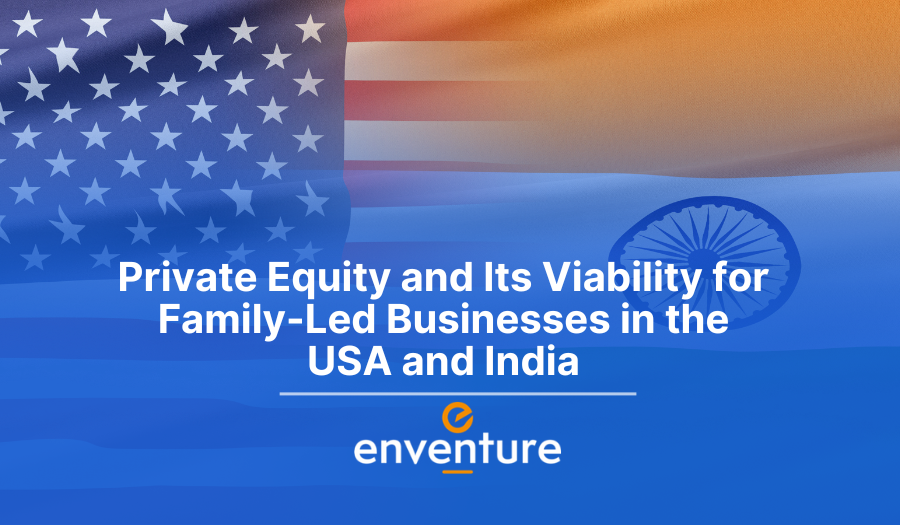Private equity helps family-led businesses in the USA and India scale, modernize, and manage succession while preserving legacy and values.

By Ankit Shrivastava, Managing Partner, Enventure
Family-led businesses form the backbone of many economies. In the United States, they account for nearly 60% of employment and contribute significantly to GDP. In India, family enterprises dominate the business landscape, representing over 80% of businesses across sectors. Despite their resilience and deep-rooted legacy, family-led firms often face unique challenges: succession planning, limited access to capital, and balancing tradition with innovation. In this context, private equity (PE) has emerged as a viable partner to help such businesses unlock growth and long-term sustainability.
The Role of Private Equity in Family-Led Businesses
Private equity provides more than just financial capital. It brings strategic expertise, operational improvements, governance structures, and global networks—factors often lacking in family-led firms that rely heavily on legacy practices. The involvement of PE can address common pain points such as:
-
Succession and Leadership Gaps: Family businesses often struggle with generational transitions. PE investors can professionalize management and introduce merit-based leadership.
-
Capital for Growth: Expanding into new markets or scaling operations requires capital beyond what internal reserves or bank loans can provide.
-
Governance and Transparency: Many family firms operate informally. PE involvement enforces stronger governance, compliance, and accountability practices.
-
Global Competitiveness: With cross-border experience, PE firms can help local businesses adopt international standards and tap global opportunities.
Private Equity in the USA
In the United States, private equity has long been a catalyst for scaling family-led businesses. Mature PE markets, well-defined regulations, and a culture of external partnerships make it easier for family businesses to embrace PE funding. Examples range from mid-sized manufacturers to service companies that leveraged PE to expand, modernize, and professionalize operations.
However, cultural alignment is key. U.S. family businesses are often open to external investors, provided the family’s core values and legacy are preserved. PE firms in the U.S. typically adopt collaborative approaches, structuring deals that allow families to retain significant equity while ensuring the business evolves strategically.
Private Equity in India
In India, family-led businesses dominate industries from textiles and retail to pharmaceuticals and technology. The demand for private equity has grown significantly as these firms aim to professionalize operations, access global markets, and compete with multinational corporations.
Yet, Indian family businesses face unique challenges: reluctance to dilute ownership, emotional attachment to legacy practices, and resistance to external oversight. Despite this, successful partnerships have emerged where PE investors respected cultural sensitivities while driving modernization. The Indian market also presents opportunities for PE in second-generation transitions, where younger family members seek to scale aggressively but require both capital and expertise.
Comparative Viability: USA vs. India
-
Openness to PE: U.S. family businesses are generally more accepting of PE, while Indian counterparts often show caution due to ownership concerns.
-
Regulatory Environment: The U.S. offers mature legal frameworks for PE, whereas India is still streamlining processes, though progress has been notable in recent years.
-
Growth Potential: India presents higher growth potential due to its rapidly expanding markets, while U.S. family firms offer stability and well-structured partnerships.
-
Cultural Integration: U.S. deals are more transactional, while Indian deals require deeper relationship-building and trust between investors and families.
Conclusion
Private equity is increasingly viable for family-led businesses in both the United States and India. For U.S. firms, it offers a path to scale and modernization in competitive markets. For Indian family enterprises, it provides the resources and expertise needed to compete globally while navigating generational shifts.
The key lies in balance: respecting the legacy and values that define family-led businesses, while embracing the strategic and financial discipline that private equity brings. Done right, these partnerships can transform legacy-driven enterprises into future-ready businesses.
About Author
Ankit Shrivastava is the Managing Partner at Enventure, where he leads investment and strategic advisory across the U.S. and India. His work bridges global innovation in healthcare, space, and sustainability through data-driven decision-making and long-term partnership
Bold Moves,
Brighter Futures
Let's team up and make a difference.
Subscribe to our newsletter
Enventure is an exit-driven fund with high-yield opportunities in the healthcare, space, and green tech sectors across the US and India.
Mail Us
3103 Kewanee Ln,
Naperville, IL, 60564
Copyright © 2025 Enventure, all rights reserved.
